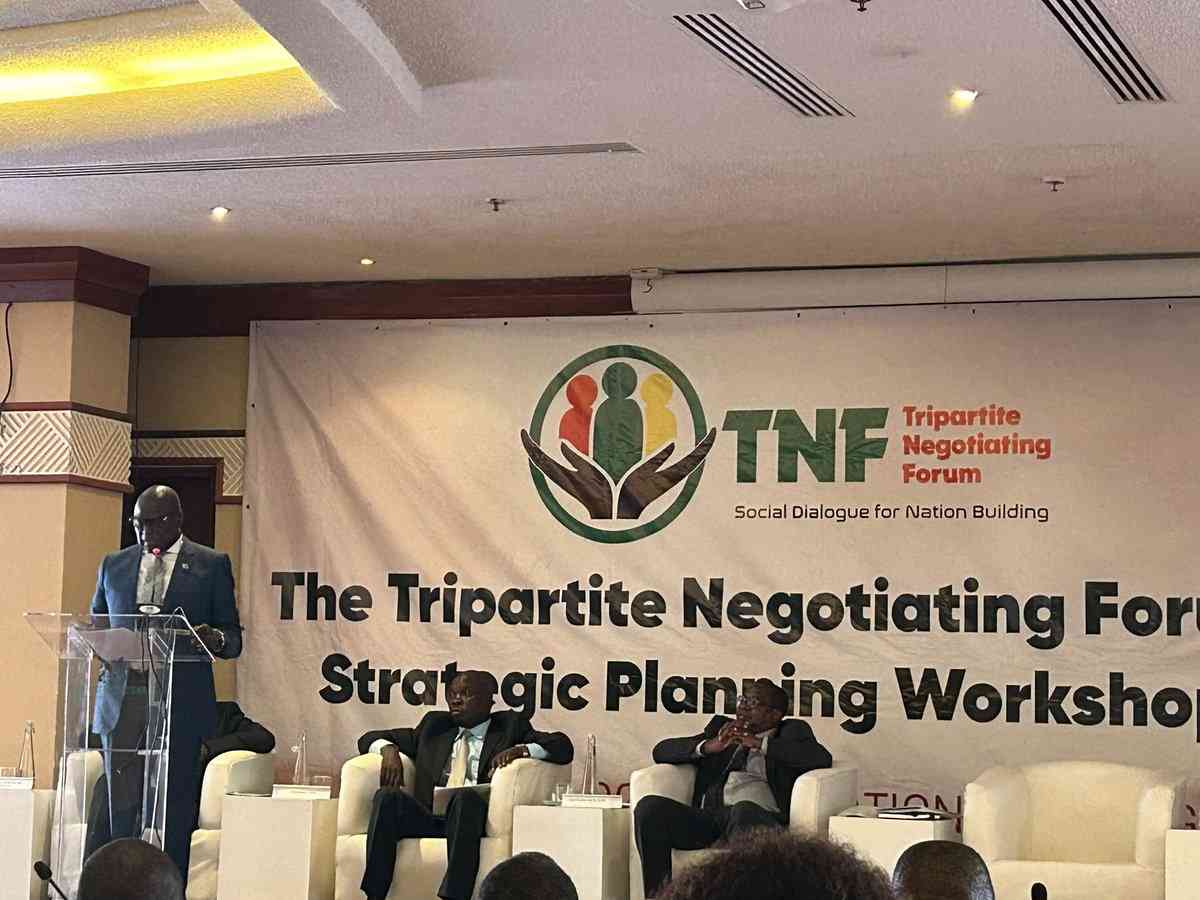
Zimbabwe has traversed a complex socio-economic landscape marked by deepening poverty, unemployment, and economic instability.
With a significant portion of its workforce operating in the informal economy, the necessity of inclusive dialogue among social partners has never been more pressing.
The Tripartite Negotiation Forum (TNF) serves as an essential platform for facilitating dialogues between the government, employers, and trade unions representing workers.
However, an important demographic—workers in the informal economy—remains largely excluded from these discussions. Expanding the social dialogue platform to include these workers is vital for several reasons, including but no limited to enhancing social equity, addressing economic challenges, fostering labour rights, promoting sustainable development, and strengthening governance.
Zimbabwe’s economy has undergone significant transformations over the past two decades, with pre-economic crisis periods seeing formal employment become scarce.
Today, the informal economy employs approximately 94% of the country’s labour force, according to various reports.
This segment includes small-scale traders, vendors, artisans, and many others who lack stable employment and social protections.
Despite their contributions to the economy, informal workers face numerous challenges, including lack of access to social security, inadequate working conditions, and vulnerability to exploitation.
- Restrictive SIs rile business
- Interview: Tug of war in TNF over minimum wage…Unions demand SI, govt and business dig in
- Biggest forex windfall in 42 years... as Zim rates hit the roof, US$ gains traction
- Expanding the social dialogue platform: Integrating workers from the informal economy in Zimbabwe
Keep Reading
The absence of a platform for these workers to voice their concerns has resulted in a lack of representation in formal negotiations that shape labour and economic policies. Incorporating informal workers into the TNF is essential for addressing their challenges and experiences, thereby crafting policies better aligned with the realities of the workforce they represent.
Expanding the TNF to include informal economy workers is critical for promoting social equity in Zimbabwe.
Workers in the informal economy are among the most marginalized, using their skills and labour to survive while lacking basic labour rights and protections enjoyed by their formal counterparts. By including these workers in TNF discussions, the government and employers can better understand the socio-economic realities they face and devise policies that address their needs.
An inclusive TNF can advocate for fair policies such as minimum wage protections, health and safety regulations, and access to social security schemes (even for informal workers).
This would not only empower workers but also help bridge the inequality gap between formal and informal workers. When every worker, regardless of their employment status, is allowed to participate in dialogue and decision-making, social justice is advanced, fostering a more harmonious and fair society.
Zimbabwe is grappling with numerous economic challenges, including inflation, unemployment, and economic stagnation.
These economic issues are further exacerbated by the existence of a large informal sector, where operations often go unregulated.
By omitting informal workers from the TNF, policy discussions have failed to address critical issues affecting this significant segment of the workforce, which in turn impacts the overall economy.
Incorporating informal workers into the TNF can lead to the formulation of strategies that address structural challenges.
For instance, the TNF can promote initiatives aimed at transitioning informal businesses into the formal sector, which would enhance tax revenues for the government while providing workers with necessary protections and benefits.
This involvement could help create an environment conducive to sustainable economic growth, as informal workers can contribute to the nation’s development more effectively when their rights and needs are considered.
One of the most significant advantages of expanding the TNF to include informal economy workers is the strengthening of labour rights across the board.
In Zimbabwe, informal workers often operate in precarious conditions, exacerbated by the absence of legal protections.
Incorporating their voices into the TNF enables a concerted effort towards advocating for labour rights within the informal sector. Increased representation will allow for the establishment of a framework that safeguards informal workers' rights.
For instance, discussions can focus on creating legal frameworks that recognize informal employment and offer protections similar to those available in the formal sector.
Furthermore, worker representation in the TNF can serve as a powerful mechanism for raising awareness and driving campaigns regarding the rights of vulnerable workers.
Such initiatives can foster a more robust labour movement that uplifts all workers.
The inclusion of informal workers in the TNF can also play a pivotal role in promoting sustainable development in Zimbabwe.
The informal economy often operates outside of regulatory frameworks, which can lead to unsustainable practices that contribute to environmental degradation.
By including informal workers in these discussions, the TNF can address sustainability more holistically, recognizing the environmental implications of the informal economy.
For example, the TNF can facilitate discussions around sustainable practices for informal businesses, encourage training and education on sustainable resource use, and promote green entrepreneurship.
When informal workers are actively engaged in policy discussions about sustainability, it leads to a more successful transition to a green economy, addressing both environmental challenges and the economic needs of informal workers.
The legitimacy of governance systems in Zimbabwe has often been challenged due to perceptions of exclusion and ineffectiveness in addressing the populace's needs.
By expanding the TNF to incorporate informal workers, the government can enhance its governance framework, promoting stability through inclusive dialogue.
When more stakeholders are considered in the governance process, it builds trust between the government and its citizens.
Furthermore, active participation in social dialogue allows informal workers to voice their concerns, ensuring that government policies reflect the collective interests of the workforce.
This engagement can lead to more robust policy development and implementation, as well as mitigate social unrest resulting from perceived inequalities and injustices.
A stable socio-economic environment ultimately benefits the entire country, fostering a climate conducive to foreign direct investment and development.
Learning from global best practices is another essential factor in expanding the TNF to include informal economy workers.
Across various countries, there are successful models of integrating informal workers into formal structures, drawing on lessons from their experiences to inform Zimbabwe’s approach.
For instance, countries like India and Brazil have made strides in organizing informal workers into cooperative structures that facilitate their inclusion in formal bargaining processes.
By examining such successful initiatives, the TNF can adapt strategies that resonate with Zimbabwe’s unique context.
Knowledge exchange can foster innovation in policy design, ensuring that informal workers are represented and that their specific needs are considered in decision-making processes.
The need for an expanded Tripartite Negotiation Forum (TNF) in Zimbabwe that includes workers from the informal economy is not just a matter of social justice; it is a crucial step towards addressing the stark realities faced by the majority of the working population.
By promoting social equity, addressing economic challenges, strengthening labour rights, fostering sustainable development, and enhancing governance, the inclusion of informal workers can profoundly changes the socio-economic landscape of Zimbabwe. It is my view that the future of Zimbabwe hinges on its ability to build inclusive dialogue that embraces all segments of its workforce.
An expanded TNF represents the potential for transformative policies that not only address the immediate challenges facing informal workers but also pave the way for a more equitable, sustainable, and prosperous future for all Zimbabweans.
The time to act is now, as the voices of the informal workforce must be integrated into the broader narrative of national development.
*Samuel Wadzai is an Informal Economy Expert and currently the executive director for the Vendors Initiative for Social and Economic Transformation (VISET) Feedback: Email address: swadzai@visetonline.org
These weekly Perspectives articles are coordinated by Lovemore Kadenge, an independent consultant, managing consultant of Zawale Consulants (Private) Limited, past president of the Zimbabwe Economics Society and past president of the Chartered Governance & Accountancy Institute in Zimbabwe. Email- kadenge.zes@gmail.com and Mobile No. +263 772 382 852









